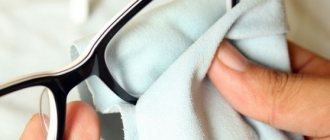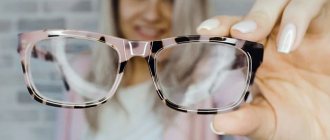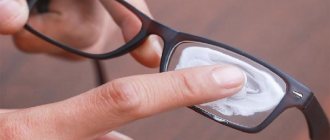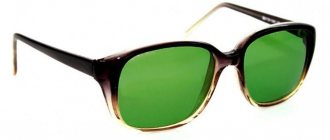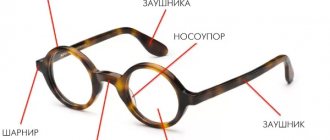Cleaning products
Before moving on to methods for removing dirt from lenses, we list those products that should not be used:
- glass and mirror cleaner;
- ammonia;
- bleach;
- vinegar;
- lemon juice;
- toothpaste;
- paper towels;
- face wipes.
Also, avoid breathing on your lenses and then wiping them with a cloth, such as clothing.
Common products such as vinegar and lemon juice should not be used when cleaning lenses.
Best remedies:
- water;
- dishwashing liquid;
- medical alcohol;
- microfiber cloth;
- wipes for lenses.
Let's take some cleaning products and test their effectiveness. What would be the best solution other than dish gel, which is the most recommended product?
Alcohol. Most eyeglass cleaning solutions contain alcohol. Take a spray bottle of any size and use the following recipe.
Fill it three-quarters full with 96% alcohol. Add 2 small drops of dish liquid and fill the bottle with water. Shake the mixture gently, being careful not to create bubbles. Now simply spray it on both sides of the lenses and gently wipe them with a soft cotton cloth.
Cleaning wipes. You can buy special wet wipes at the optics to take care of your glasses outside the home. Don't forget that wipes dry quickly, so don't waste time, quickly wipe the glass on both sides, and then the frame on the bridge of your nose and nose pads.
Cloth. The biggest mistake in lens care is breathing on them and using the edge of your shirt to rub off stains. This will cause significant damage to the glasses because clothing contains dust and other particles that can easily scratch them.
A necessary condition for cleaning glasses is the use of liquid, but it is not involved in this method. Therefore, dust particles from the fabric will be pressed into the glass and scratch it as they move.
Using a microfiber cloth, you can clean not only various surfaces, but also glasses without streaks
Microfiber cloths. Microfiber is considered the best for cleaning any materials that are susceptible to scratches. However, dust and debris can still get into the fabric, so it's important to keep it clean - hand wash it every week and hang it to dry. Do not use microfiber to polish a dry lens.
Ultrasonic bath. If you feel the need for deep cleaning, then contact an optician or jewelers who have an ultrasonic bath. A similar device can also be purchased in a store.
Methods for cleaning and polishing lenses
Before starting work, it is important to prepare the surface and rid it of dust, dirt, fingerprints, and paint residues. Use a microfiber cloth for these purposes. Well, then you can use the following means.
- Polish for wooden furniture
An excellent inexpensive product containing wax in its composition. You will need cotton wool or a soft cloth, some polish and patience. Rub the compound into the damaged lens using circular motions without pressing on the plastic. Repeat the procedure 3-4 times, and then wipe off excess product with a clean napkin.
- Polish for silver and copper
This product is purchased in specialized stores. Apply the liquid to a cotton swab and rub into the damaged surface with slow circular movements. Try not to touch the frame so as not to damage its integrity. Excess paste is removed with a dry cloth. The polishing procedure is repeated 2-3 times depending on the desired result.
- CD Polish
You can buy a spray for restoring optical media at any technical store. The composition is applied to the lens, then rubbed in with a soft cloth without pressure. Repeat 2-3 times. The mixture dries itself, and therefore re-washing is not required.
- Car wax
The rubbing procedure is similar to furniture polish, and excess is removed with cotton swabs.
Analysis of common cleaning products
Cleaning the lenses of both sunglasses and eyeglasses should be done with care. Before you begin the actual cleaning, you need to find out what material the lenses are made of: are they glass or plastic.
Glass glasses have a number of advantages: they are hard, durable and are used by people with visual impairments; they last a long time, if, of course, they are properly looked after. In addition to positive qualities, there are also negative ones:
- if you order glass without lightening, then the weight of the lens is quite large;
- they are very fragile: if you accidentally touch the glasses on the table, they will fall to the ground and, if the glass does not break, then scratches and abrasions will clearly appear on them;
- require mandatory protection: it is recommended to store in special cases;
- not everyone is satisfied with the appearance of such accessories: many people with vision problems are confused by how they will look in certain glasses;
- In the case of large diopters, it is very difficult to choose a suitable frame for them.
Plastic glasses are not inferior in advantages to glass ones: the weight of such lenses is much less, the price is reasonable and more affordable than glass lenses, and frames, both metal and plastic, can be easily selected.
We suggest you familiarize yourself with How to clean greens in an aquarium
Among the shortcomings, we can name several of these: the material is soft, and therefore it is easy to damage, scratches appear.
There are a lot of reasons for cleaning the lenses of glasses: dust settling from the street, drops of water, greasy marks after touching your fingers; spots from eyelash cosmetics can remain on women’s glasses. All this leads to the fact that the glasses of vision glasses and sunglasses lose their transparency, becoming cloudy, the clarity of the image is lost due to spots literally in the middle of the glass, the contours of even objects that are nearby are blurred.
If you do not carry out cleaning in a timely manner, you risk not only “showing off” dirty glass, but due to the fact that you squint, try to look at the picture, strain, “sit down,” worsen your vision, or in your arsenal you will also get squint.
In order to clean the lenses of your glasses, you will need to use disposable wet wipes, microfiber cloths, special liquids and sprays for cleaning stains, soap, hair shampoo, and any dishwashing detergent.
| Means | Mode of application |
| Wet wipes | You can clean the lenses of your glasses with wet wipes, but only those that are designed for this. To purchase exactly the right ones, you should go to a specialized store or optician to buy them. Do not buy any that are lying on the shelves in the supermarket. A huge advantage of using wet wipes is the fact that they contain antibacterial substances that will not only clean the glass of dust, greenery and grease, but also eliminate germs and bacteria. But among the disadvantages are the stains left behind. |
| Water | If the lenses of your glasses are not seriously contaminated with grease or greens, you can clean them under running water. Simply run them under a low-pressure stream for 30 seconds to a minute, and then simply wipe them with a microfiber cloth or leave them on a paper towel until completely dry. |
| Toothpaste | Using toothpaste you can remove minor scratches on glass. Apply the product to each lens of the glasses and wipe in a circular motion with a cotton pad or swab, without using force. |
| Soap | At home, you can clean your glasses with regular toilet soap. And if you also have it in a liquid state, great. First of all, wash your hands, since handling glass with dirty fingers is unacceptable. Next, hold the glasses under running warm water so that the liquid gets on both sides - outer and inner. Apply liquid soap to your index finger and thumb and rub the lenses with smooth movements from side to side. Rinse off the glasses under running water and place the glasses on a napkin so that the remaining drops drain off. If time is running out, you urgently need your glasses, and there are no special microfiber cloths at hand, a dry paper napkin will come in handy. Do not rub the glass in a circular motion, just blot it. |
| Microfiber cloths | Microfiber cloths are best for removing dust, fingerprints and other contaminants from glasses. This material is soft enough and does not leave scratches on surfaces. These wipes can be used to clean both glass and plastic glasses. An alternative to microfiber cloths are suede cloths, which are suitable for removing dirt from glass glasses. |
| Soda | Baking soda is an excellent way to remove scratches from the surface of glasses lenses. Dissolve a certain amount of powder in water until a thick mixture is formed. Apply the resulting mixture in a small amount onto the optics and use a cotton pad to wipe in a circular motion. |
| Special means | To clean glass at home, the best way is to use professional products that can be purchased at pharmacies, opticians, and stores specializing in the sale of optical accessories. When buying liquids or sprays, you need to consult with the seller or pharmacist; you need to select them according to the material from which the glass is made. Products for plastic glasses are quite suitable for glass glasses, while the use of glass sprays and liquids is not suitable for cleaning plastic glasses. Buy liquids that do not contain alcohol, as they are not recommended for removing dust, greasy marks and other contaminants. Start cleaning the glass: with clean hands, apply the purchased product, whether liquid or spray, over the entire surface with even, smooth movements, and then wipe with a soft microfiber cloth. At the same time, do not apply a lot of force, be careful and careful to avoid damage to glass eyeglasses or sunglasses with plastic lenses. During the cold season, always carry napkins with you, as windows in transport, shops, and other establishments fog up when the temperature changes. Keep anti-fog sprays on hand as well. |
| Shampoo or dishwashing liquid | Hair and dishwashing detergents also work well to clean eyeglass lenses. Take a small container and fill it with water, adding a couple of drops of shampoo or dishwashing detergent to the liquid. Place sunglasses or glasses into the resulting solution. After a certain period of time, remove the accessory and rinse under running water, washing away any remaining soapy liquid. Next, blot the glasses with a napkin or leave the water to drain by placing the glasses on the paper. |
We invite you to familiarize yourself with the most effective do-it-yourself mousetrap.
Cleaning sprays can be purchased at optical stores. They are good to take care of if you are traveling. To clean your glasses without streaks, use a generous amount of spray. Wash away dust and other contaminants before drying your lenses.
To remove small stains, keep a microfiber cloth on hand throughout the day. Wipe in the right direction: from temple to nose. Wipe the center edge of the frame and the bridge of your nose last, as they may leave marks due to constant contact with your skin. But if you polish a plastic accessory too often, it will eventually damage the coating, frame paint, and special finish.
Wet wipes for optics are convenient for traveling
The coating is used for various purposes. For example, colored green protects the eyes from sun glare, lilac and pink increase the contrast between water and greenery. With a hydrophobic coating, drops will not turn into spots, and photochromic coating changes light transmission. You need to know that the coating should not come into contact with ammonia, bleach, vinegar or window cleaner, which can destroy it.
Why is it important to clean your glasses?
It's not just that glasses with stains on the lenses look unsightly and are hard to see through. Touch stains, dust, splashes, skin particles, plaque, cream residues, mascara - this is not a complete list of what can end up on glasses. Due to such contamination, the following consequences may occur: the eyepieces will lose transparency; objects will appear blurry; the contours of objects may acquire a rainbow rim; and spots with strange shapes will appear in front of your eyes. If you constantly look through lenses with spots, you risk not only exacerbating existing vision problems, but also developing strabismus.
What to use to clean glasses:
- Spray cleaners - specialized sprays and liquids are gentle on optical devices. They remove all organic and inorganic contaminants from the lenses, while their contact with the plastic frame does not lead to the formation of a film. Most of them, in addition to their main function, also have an auxiliary option, for example, antistatic or can additionally prevent fogging. This is a pressing problem that arises when there is a sharp change in temperature; a clear example of this is when entering a warm room from a winter street. Lenses treated with the solution are much less susceptible to fogging.
Important!
Plastic lens sprays will not affect glass lenses, but glass cleaner may damage the plastic.
- Microfiber cloths are best for removing dust, fingerprints and other contaminants from the juices. This material is soft enough and does not leave scratches on surfaces. These wipes can be used to clean both glass and plastic glasses. An alternative to microfiber wipes are suede wipes, which are suitable for removing dirt from glasses with glass lenses. You need to wipe in the right direction: from the temple to the nose. Wipe the center edge of the frame and the bridge of your nose last - they may leave marks due to constant contact with the skin.
- Wet wipes—you can clean your glasses with wet wipes, but only those that are specifically designed for this purpose. To find exactly these, you should go to a specialized store or optician for them. A huge advantage of using wet wipes is the fact that they contain antibacterial substances that will not only clean your glasses of dust and dirt, but also eliminate germs and bacteria. But there is also a disadvantage of this method - divorces.
- Warm soapy water - When using water to clean lenses, it is recommended to follow the procedure in the following order:
1. Add a small amount of non-aggressive liquid detergent to a container with warm water; 2. Wash the glass thoroughly on both sides using a soft cloth. 3. Leave the glasses for a few minutes so that the water runs out and their surface dries out a little. 4. Wipe the product well with a clean, dry microfiber or flannel cloth. 5. After these manipulations, it is recommended to hold the glasses up to the light and make sure that the surface is clear of stains and streaks.
Important!
It is recommended to buy sprays and cleaning liquids in specialized stores. There are a lot of low-quality products on sale that contain substances that cannot be used to wipe lenses (for example, abrasives and alcohols).
Remove dirt from hard-to-reach areas of glasses
The design of the glasses is such that dust and dirt accumulate in different parts of them especially often. You need to get rid of it periodically. To do this you will need cotton swabs or toothpicks. After removing dirt from the crevices, rinse your glasses in warm running water and dry them naturally.
Methods for removing dirt
Follow these steps to properly clean your glasses and sunglasses:
- Wash and dry your hands thoroughly. Use lotion-free soap or dishwashing liquid and a clean, lint-free towel.
- Rinse the accessory under running warm tap water. This will remove dust and other debris, which will help avoid scratches when cleaning. Avoid hot water, which can damage some glass coatings.
- Apply a small drop of dishwashing liquid to each lens. Use only products that do not contain lotions, hand moisturizers, vinegar or citric acid.
- Gently wipe both sides of the lenses and all parts of the frame for a few seconds, including the nose pads and temple ends. Pay attention to the place where the edges of the glass meet the frame to get rid of plaque, dirt and grease there too.
- Rinse both sides of the lenses and frame thoroughly.
- Gently shake the glasses to remove most of the water. Carefully inspect the glass to make sure it is clean.
- Dry the glass and frame with a clean, lint-free towel. Use a kitchen cloth that has not been washed with fabric softener (this substance can damage the optics). Make sure it is perfectly clean. Dirt or debris caught in the fibers can scratch the glass.
- Inspect the lenses. If any streaks or stains remain, remove them with a clean microfiber cloth.
We invite you to familiarize yourself with Useful tips on how to wash ballpoint and gel pens from white clothes
The second, more delicate, but also effective way to use dishwashing liquid is as follows: soak your glasses in a bowl filled with warm water with a spoonful of detergent. After this, wash them under warm water. Gently dry any remaining drips with a clean microfiber cloth. Swimming goggles require even more delicate care: it is best to simply wash them under running warm water and air dry without wiping.
Recommendations for cleaning glasses lenses
An important point - before deciding how to clean your glasses, do not forget to first prepare the surface of the lenses for cleaning if there is serious contamination in the form of dirt and dust, otherwise scratches cannot be avoided. In this case, you need to thoroughly rinse the product under running warm water until all visible grains/dust particles disappear from scratch-resistant surfaces.
After this, you can begin to clean the lenses of your glasses (if there is no heavy contamination, you can do without the described preparatory stage), following one of the following methods:
1. Ideally, to properly clean glasses, you need to use liquids and wipes specially designed for this purpose , which can be purchased at optical stores. The cleaning principle in this case is very simple and usually consists of wiping the lenses with a cloth, previously moistened with a small amount of liquid. Although, there may be nuances that you will learn about from the description on the bottle of the product or the insert that comes with it.
By the way, it is recommended to wipe glasses not with circular movements, but with progressive ones - from bottom to top or from side to side. This will reduce the risk of scratching the glass by abrasive particles that may not be visible to your eyes.
2. To clean your glasses from grease that accumulates on the lenses during use, you can use dishwashing detergent . Only liquid or gel detergent will do. Powdery ones are death for lenses.
One drop of detergent on each glass will be enough. The applied product must be foamed, evenly distributed over the surface and rinsed with warm water. Then it is recommended to wipe the glasses with the same special napkin or a piece of clean cotton cloth.
Instead of dish soap, you can also use suds from soapy water to remove stains from glasses.
3. If you don’t have a special liquid, detergent, or wipe on hand, the last resort to clean your glasses from streaks is a clean and, most importantly, damp cotton towel (a dry one can scratch the lenses even if it seems very soft).
4. Many types of frames have places where dirt accumulates that is difficult to remove using standard methods. In such cases, you need to additionally clean your glasses from dirt with a cotton swab, previously soaked in one of the above-mentioned liquids . Many people recommend alcohol, but in the case of lenses with additional coatings, this can cause damage to them.
Cleaning your glasses frames
You can clean your glasses frames at home with the same wet wipes you use to wipe your glasses.
Thanks to this procedure, the coating of the frame does not quickly wear off and will not be scratched.
If green appears on the frame of your glasses, you should replace it with a better one. If you are going to try to clean the frame of this contamination, take a screwdriver and unscrew the nose pads. Next, use a toothbrush, dipping it in a soapy solution or dishwashing liquid, to remove the greens.
General care recommendations
It is also worth familiarizing yourself with general recommendations for caring for glasses at home and be sure to follow them if you want your optical accessories to last longer.
- Under no circumstances should you wipe the lenses of sunglasses or eyeglasses with your clothing, even those made of natural cotton fabric or a piece of material, soaking them in vinegar solution, ammonia and other alcohol-containing preparations, or special glass and mirror cleaners. Vinegar and other liquids will harm plastic glasses.
- Glasses must be stored in a case. A more reliable option would be a hard one, since storage in a soft case will not protect against shocks and accidental presses. You can also put a microfiber cloth in a special container for glasses so that it is always at hand.
- It is recommended to put on and take off glasses with both hands to prevent the temples from becoming deformed.
- You should also not wear glasses as a hair band, as this will cause the temples to widen.
- Even if you don’t wear glasses all the time, but, for example, wear them while working at a computer in the office, take a microfiber cloth with you. In case of cloudiness, you can easily clean the dirty glass.
- It is worth rinsing your glasses regularly under running warm water as a preventative measure.
- Don't forget to clean the frame. The same products are suitable for this as for cleaning glass.
- Avoid direct sunlight on the lens, as this will reduce its quality.
So you have learned how to clean your glasses at home. We have offered you several cleansing options - choose the one that suits you. Good luck!
How to clean white deposits from glasses frames
Maybe it will be useful to someone! A wild white coating has formed on the plastic frame! It was a pity to change glasses because of this, since the frames are expensive, the wear period is still short, information on the Internet advised cleaning: with acenote, alcohol, ultrasound, some wrote that it was impossible to clean! . Not a single method helped me, there is no ultrasonic cleaning in the city, but I couldn’t accept it
